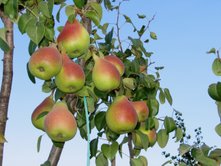
Bringing artistry to the orchards
The Jerusalem Post, September 11, 2009
There’s something new coming from one of Israel’s oldest communities—fruit bearing curious names like Watermelon Plums, Plumegranates, and Pita Peaches.
They’re the creative product of Ben-Dor Fruits and Nurseries, which is located in Yesud Hama’ala. Founded in 1883 during the first aliyah, Yesud Hama’ala’s early settlers took advantage of the Galilee’s rich Hula Valley, laying the agricultural roots that remain today.
Though the Ben-Dors were among the founders, their family farm didn’t evolve into a thriving business until 23 years ago, when Seffi Ben-Dor took over. Ben-Dor, who paints in his spare time, brought artistry to his orchards. Using traditional methods of selective pollination, Ben-Dor began crafting unique varieties of stone fruits, the family that includes plums, peaches, and apricots.
There are the Watermelon Plums, named for their green skins and red flesh. Trickling springs of juice appear as Reut Ben-Dor, Seffi Ben-Dor’s daughter, slices one. “The goal,” she says, “is to create a healthy fruit with the best appearance and flavor.”
Plumegranates bear the color and shape of pomegranates, but a bite through their dark flesh reveals them to be much sweeter. The Pita Peaches are squat, like flatbread, but are thick with flavor. A bright yellow Lamoon, an inverted-tear-shaped plum, reminds of a lemon, as does the slightly tangy taste.
Reut Ben-Dor holds up a small orange apricot dubbed the Aromacot due to its intense fragrance. “We’re the only ones in the [Israeli] market with an apricot out right now,” she remarks. In addition to creating hybrids, Ben-Dor breeds within group to strengthen desirable characteristics. Sometimes this translates to a stronger fruit with a longer growing season.
Recently, Ben-Dor has branched out beyond summer fruits, offering an autumn pear, the Red Druz. Of course, it’s got a twist—long after other growers have harvested their pears, the Red Druz are ripening on the trees, making it the only non-refrigerated pear available in early September.
And some of Ben-Dor’s fruits might extend their longevity to the consumer, as well.
A study conducted by Joseph Kanner, a professor of food science at the Agricultural Research Organization’s Volcani Center, found that Ben-Dor’s Red Heart family plums have the most antioxidants of any fresh fruit sold in Israel. The red flesh plums have three times the level of antioxidants found in pomegranates; they are five times higher in antioxidants than red wine.
New varieties are created and tested in Ben-Dor’s nurseries and orchards, which span approximately 2500 dunams of land. They are then tested again in semi-commercial and commercial trials. Each new fruit takes between 10 and 15 years to perfect.
Ben-Dor brings the same obsessive approach to already developed varieties. The orchards are closely monitored; the fruit is watched until it reaches the best moment for picking. Ben-Dor avoids cold storage and pesticides as much as possible.
A decidedly upscale fruit, handcrafted and pampered, is the result. As such, Ben-Dor fruits are sold upmarket and a majority of their customers are abroad in countries including New Zealand, Australia and the United Kingdom. In England they are available at stores like Marks and Spencer; in Israel you’ll find them at Tiv Taam and the Tel Aviv Port farmer’s market.
Although Ben-Dor fruits are homegrown, they were introduced to local consumers only a few years ago. “They were a little expensive [for Israelis],” Reut Ben Dor remarks, holding her thumb and forefinger close together.
But prices aren’t coming down—they continue to slowly creep upwards as Ben-Dor faces increased production costs in a tough economy. Water problems also loom large as Israel remains in a serious drought. The government has already slashed farmers’ water quotas and Ben-Dor anticipates that additional reductions lie in the future.
Despite these difficulties, Ben-Dor remains optimistic. Their unique fruits, many of which are patented, are a niche market.
So what’s next? Super vegetables with a name like Carrocoli and Asparachini?
“No, we’re sticking with the fruits,” Reut Ben-Dor says with a smile, mentioning that just this week, they’ve added a new member to the Ben-Dor family. “It’s a striped plum. Very sweet.”